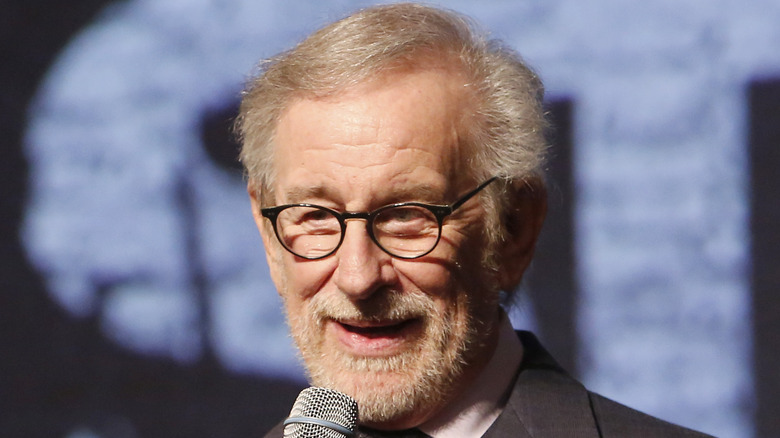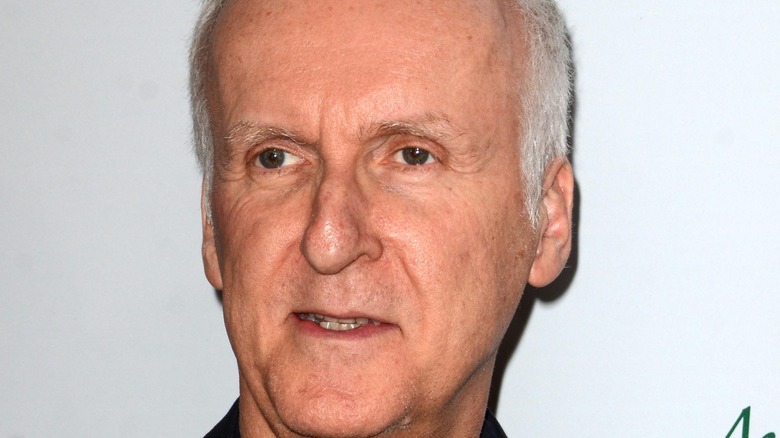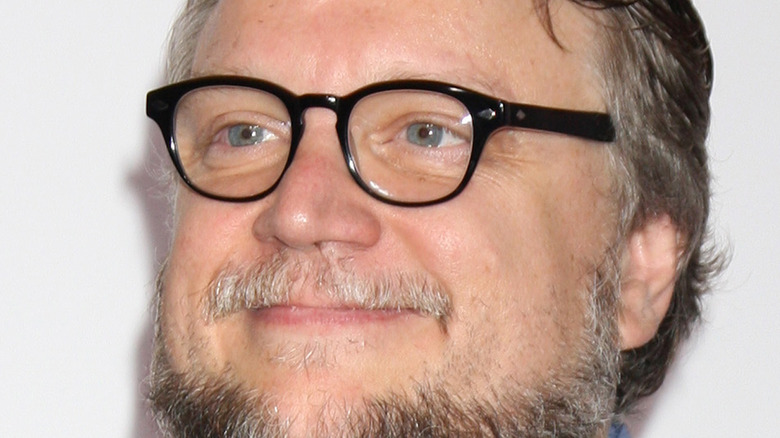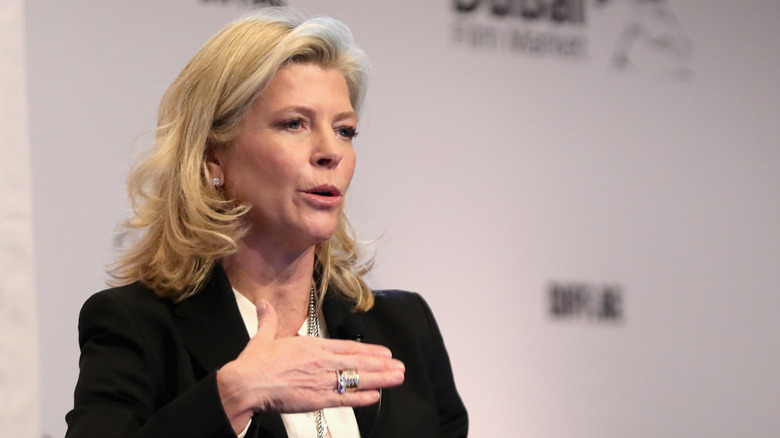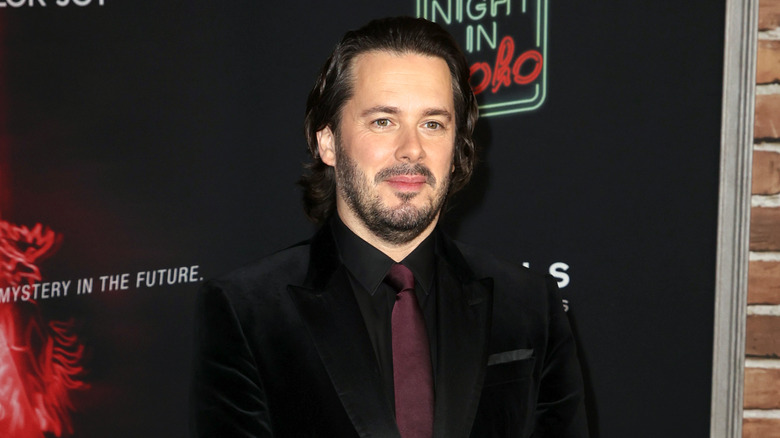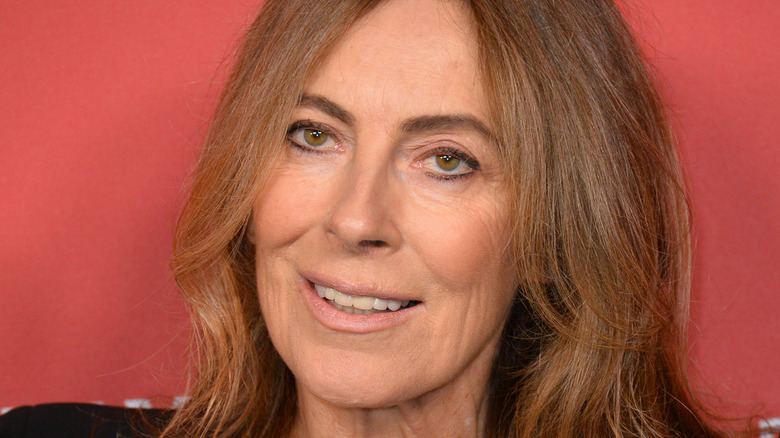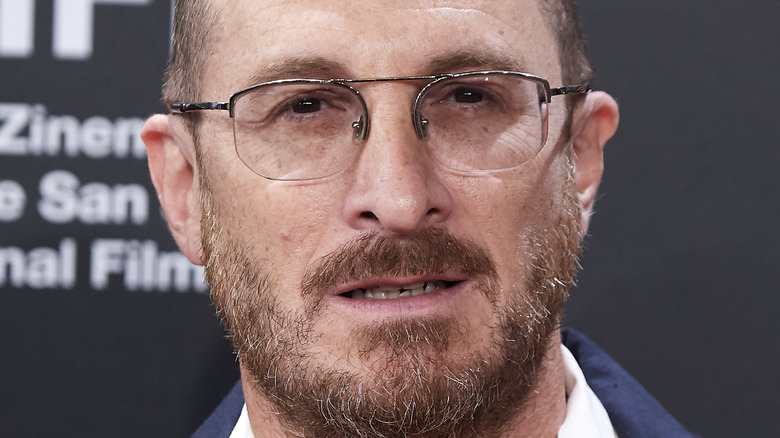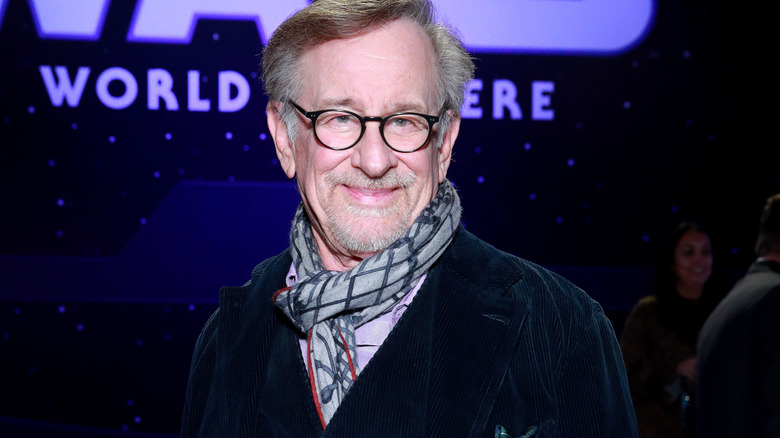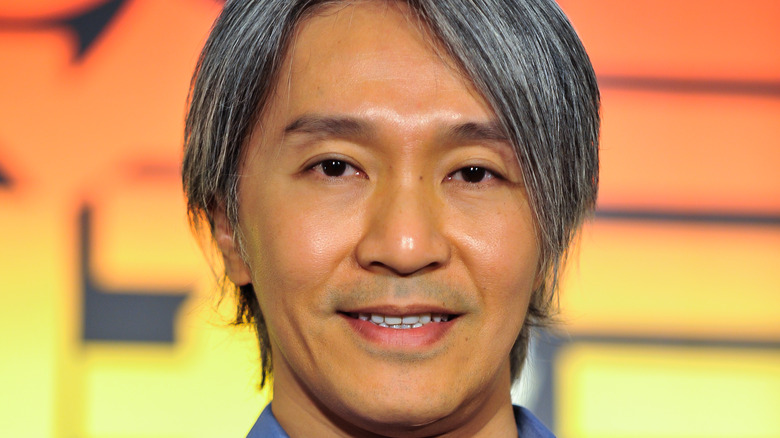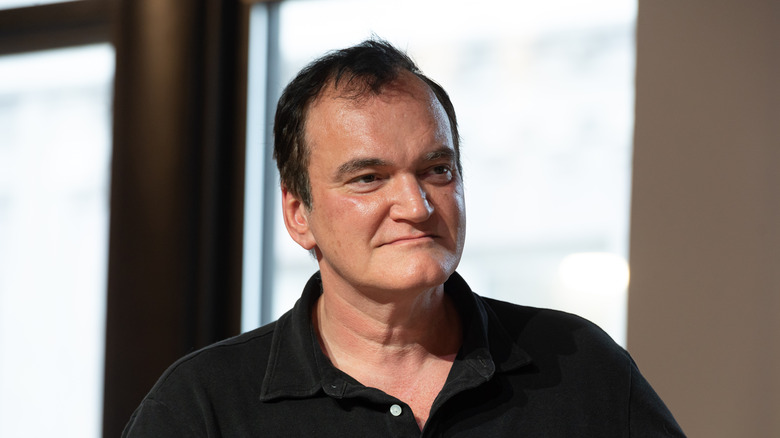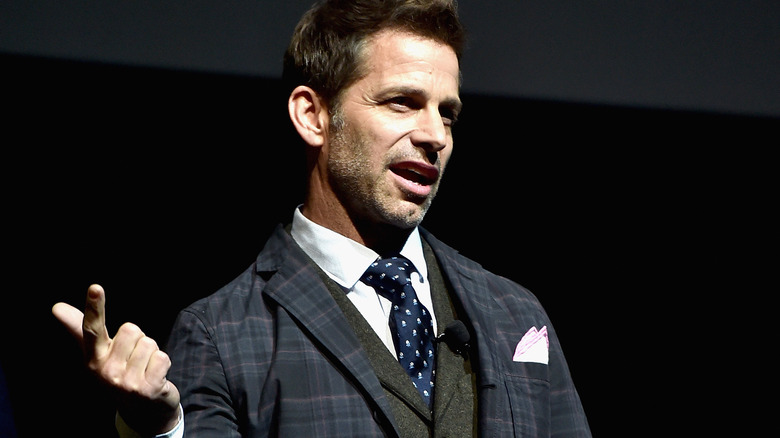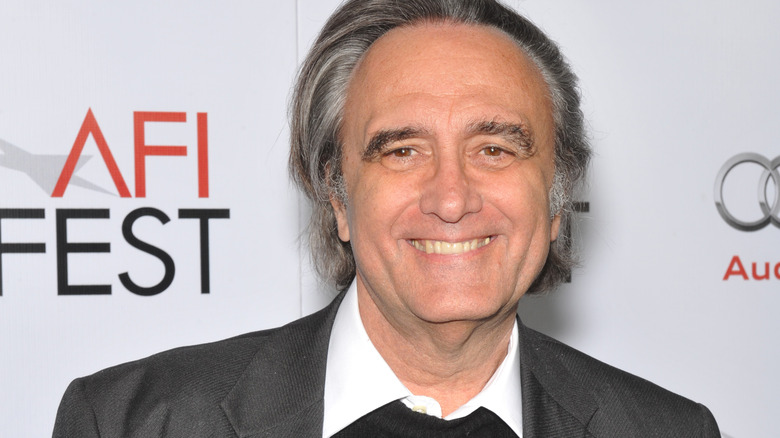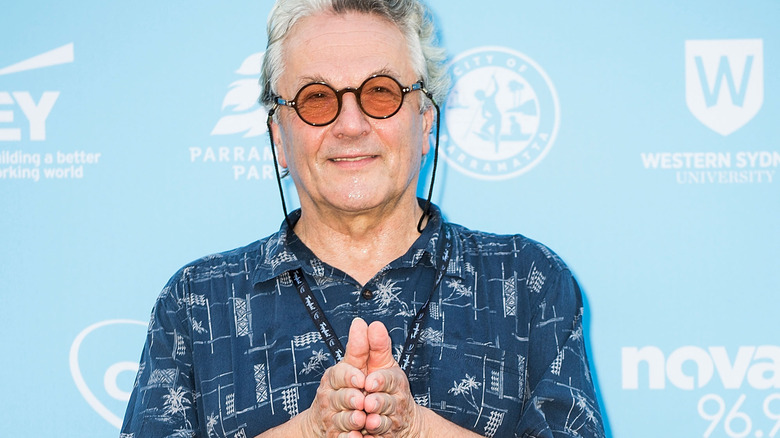Iconic Filmmakers Who Almost Directed Superhero Movies
Several notable names have directed modern superhero movies. However, by and large, franchises like the Marvel Cinematic Universe and the DC Extended Universe prefer to use up-and-coming filmmakers, like Jon Watts or Destin Daniel Cretton, to helm their major projects. These directors can end up producing quality productions, even quite frequently, but their stamp on the production is often less distinctive than more auteur-driven superhero movies of old like Ang Lee's "Hulk" or the Tim Burton "Batman" titles. Just because more famous and immediately recognizable filmmakers aren't very common in the realm of modern superhero movies, though, doesn't mean such figures haven't been approached to direct them.
Over the years, many unforgettable directors ranging from James Cameron to Steven Spielberg to Edgar Wright have been approached and even temporarily signed on to helm superhero flicks. For a variety of reasons, though, these mergings never came to pass. Though we'll never see these movies on our DVD shelves or in movie theaters, it can still be enticing to contemplate what would have happened if these iconic filmmakers had ended up directing them.
James Cameron: Spider-Man
Aside from "Aliens," James Cameron has spent his career delivering blockbusters that aren't derived from either comic books or famous novels. But that almost changed in the 1990s, when James Cameron came close to directing the first major live-action "Spider-Man" movie. He even delivered a screenplay for this prospective project, which featured unique interpretations of Electro and Sandman as the primary foes and would have been made for "Terminator 2: Judgement Day" financier Carolco Pictures. There were even concepts on casting for the titular lead role, with future "Titanic" leading man Leonardo DiCaprio eyeballed for the part of Peter Parker/Spider-Man. It's easy to imagine a project combining this talent and IP being as massive of a success as many of Cameron's other blockbusters.
Ensuing financial difficulties for Carolco Pictures put the project on ice and the eventual absorption of the film rights to "Spider-Man" by Sony/Columbia Pictures guaranteed that Cameron's iteration of the superhero movie would never see the light of day. Of course, Cameron's subsequent career has proven he didn't need a superhero movie blockbuster. After "Spider-Man" petered out, Cameron focused on getting his unique vision for "Titanic" and the "Avatar" franchise off the ground. One can only sit and ponder what the pop culture landscape would look like if the man behind "Terminator 2: Judgement Day" had brought a "Spider-Man" film to completion.
Guillermo del Toro: Thor
Over the years, Guillermo del Toro has had his name floated around for many different prospective superhero properties. Why wouldn't he? Not only is he a fan-favorite filmmaker through movies like "The Shape of Water," but he's crushed prior superhero-movie-directing gigs with films like "Hellboy" and "Blade II." It's understandable why he would be considered for other superhero fare, especially for flicks like "Thor," which intersects with the fantasy genre.
Del Toro came quite close to directing 2011's "Thor." These discussions emerged when del Toro was hot off "Pan's Labyrinth," making him an understandably desired commodity by Marvel. However, he would eventually pass on the project, with del Toro reflecting years later to Collider that he was attracted to doing "a fantastical version" of classical Norse mythology, but that "Thor" and other superhero movie opportunities like "The Wolverine" eventually fell off his radar because "I'm not a superhero guy." That does fit with even the superhero projects del Toro has helmed. Vampire Blade and son of Satan Hellboy are much more like classic monsters than perfect-looking, God-like Thors. This rationale makes it clear why Guillermo del Toro typically doesn't engage with such projects.
Michelle MacLaren: Wonder Woman
While Michelle MacLaren has been working in television for decades, it was her directorial efforts on "Breaking Bad" that took her to the next level of fame. With the show, MacLaren cemented herself as a name to watch out for. It only made sense that she'd graduate next to helming feature films. Shortly after the last season of "Breaking Bad" wrapped up in 2013, MacLaren hopped onboard "Wonder Woman," the long-awaited solo live-action film debut of the seminal comic book character.
Signing on at the end of 2014, MacLaren had been the favorite for the directing gig by Warner Bros. brass and had been pursued by the studio for months. The plan was to have her develop a story with screenwriters, giving her extra creative muscle on the production. This intriguing union was not long for this world, though, as a few months later MacLaren would step down from the project and Patty Jenkins would eventually take over "Wonder Woman." MacLaren, meanwhile, has remained incredibly busy directing episodes of prolific TV shows like "The Morning Show" and "Better Call Saul."
Edgar Wright: Ant-Man
When Marvel Studios announced its first slate of titles, one curious production was "Ant-Man," hailing from director Edgar Wright. Fresh off "Shaun of the Dead," Wright had already established himself as a comedic filmmaker with a distinctive voice worth paying attention to. It's no wonder Marvel Studios wanted to align themselves with his work, especially when it came to a C-list character like Ant-Man. This plucky superhero would need to have a captivating aesthetic if he was going to become the next Spider-Man or Batman at movie theaters.
While many iconic filmmakers only briefly flirted with directing a superhero movie before jettisoning the project, Wright stayed on "Ant-Man" for nearly a decade. Penning new drafts while he worked on other films like "The World's End," Marvel Studios eventually pushed "Ant-Man" forward for a July 2015 release date. Wright began casting the film with actors like Paul Rudd and Michael Douglas, and his regular cinematographer Bill Pope was hired to lens the project. Two months before filming began, though, Edgar Wright departed the project, with the filmmaker later clarifying that Marvel's desire to have a separate screenwriter pen a draft of the script and the studio's lack of interest in his creative vision led to him abandoning "Ant-Man." All those years of being attached to "Ant-Man" couldn't lead to Edgar Wright's take on the tiny superhero becoming a reality.
Kathryn Bigelow: X-Men
Women directors have long been on the sidelines of the comic book movie genre. Recent years have seen this turn around thanks to filmmakers like Patty Jenkins, Chloe Zhao, and Cathy Yan, among others — but for much of the genre's history, women directors were not invited to the table. That status quo might have changed, or at least been slightly altered, if an early version of "X-Men" had gotten off the ground with Kathryn Bigelow at the helm. It was a production that comic book writer Chris Claremont, famous for his work on the "X-Men" comics, was especially passionate about.
Though today known for directing Oscar-winning dramas like "The Hurt Locker," Bigelow was once a genre movie darling known for helming oddball exercises like "Near Dark" and "Point Break." She proved so good with vampires and gunfire, it only makes sense that Hollywood turned to her when they were trying to get these mutants off the ground. However, the project ended up sputtering out once the film's producer, James Cameron, got focused on making a "Spider-Man" movie instead. Subsequent issues with the film rights to various Marvel characters sealed the project's fate. It wouldn't be until the 2000 "X-Men" feature directed by Bryan Singer that these mutants would dominate the big screen.
Darren Aronofsky: The Wolverine
With their work together on "The Fountain," Hugh Jackman and Darren Aronofsky developed a bond that would see the duo attempt to reunite for further projects over the subsequent years. The most high-profile of these instances came with "The Wolverine." Though the final project was helmed by James Mangold, Aronofsky was the first director to be attached to the production. With Aronofsky coming fresh off his work on "Black Swan," hiring this auteur was certainly one way to indicate that "The Wolverine" wouldn't be a simple rehash of "X-Men Origins: Wolverine."
Jackman's comments on this version of "The Wolverine" indicated that, much like the final product, it would not be beholden to the aesthetic of the first solo "Wolverine" outing. He also expressed excitement over the prospect of delving into the darker underbelly of his mutant character, mirroring the sort of grim character studies Aronofsky had delivered with projects like "The Wrestler." At the start of March 2011, though, the reunion was dashed, with Aronofsky stepping down from the project due to his worries about being away from his family for so long during principal photography. Though "The Wolverine" would go on under another director, a reunion between Jackman and Aronofsky has yet to come to fruition.
Steven Spielberg: Superman: The Movie
It feels like a foregone conclusion that Steven Spielberg should have directed a "Superman" movie at some point in his career. After all, who better to lend a sense of grandeur and joy to this iconic superhero than the man responsible for some of the greatest blockbusters of all time? Spielberg's love for retro entertainment would also serve the property well. Plus, it would be fitting for a character made to be an allegory for Jewish-American experiences to be handled by a Jewish filmmaker who incorporated his faith into projects ranging from "Schindler's List" to "An American Tail."
Spielberg almost got this pivotal opportunity back in the 1970s, when the producers of the original "Superman: The Movie" were scouting around for someone to helm the important production. Spielberg was a name highly regarded by the filmmaking team, but his lack of directorial experience at the time made him seem like a less-than-ideal candidate. After "Jaws," it was clear Spielberg had the goods to deliver a big-budget version of Superman. Unfortunately, the filmmaker was now busy tackling "Close Encounters of the Third Kind." Thus, a perfect marriage of source material and director were never meant to be.
Stephen Chow: The Green Hornet
Seth Rogen's take on "The Green Hornet" had a prolific filmmaker in line to not only direct but also play the role of Kato. That honor was set to go to Stephen Chow, the last filmmaker anyone would've expected to direct a Seth Rogen flick.
But that fell apart once Chow stepped down from directorial duties in 2008. Though initially remaining on the project to perform the part of Kato, he would also vacate that role eventually, paving the way for Jay Chou to take on the character instead. As for the directorial duties, Michel Gondry eventually took over Rogen's take on the Green Hornet character. While Chow cited "creative differences," co-writer Evan Goldberg has said that Chow departed the project because he needed "utter control" over the entire movie. Though his major foray into American blockbusters fizzled, Chow's career hasn't suffered since. After leaving the role of Kato, he returned to making films for the Chinese market, including the enormously successful 2016 film "The Mermaid." He may never have gotten the chance to direct an American superhero movie blockbuster, but clearly, Chow has fared just fine.
Quentin Tarantino: Silver Surfer
Some big-name filmmakers have to be coaxed into agreeing to or even seeing a script for a comic book movie. But Quentin Tarantino has never been a typical auteur and his unabashed love for classic comics — going hand-in-hand with his affection for geeky pop culture of the 1960s and 1970s — means that he's constantly flirted with the idea of directing a comic book adaptation. One possibility emerged early on in his career when Tarantino became very passionate about the concept of directing a live-action adaptation of the Silver Surfer character.
Tarantino had a significant amount of passion for this character, but he wasn't the one who would decide the fate of whether or not a "Silver Surfer" movie would exist. That decision lay at the feet of Constantin Film, who owned the film rights to the "Fantastic Four" and related characters at the time. Though Tarantino was hot off his initial directorial efforts, Constantin Film rejected Tarantino's vision for the project and opted to keep on developing other attempts at adapting Silver Surfer and other Marvel characters. Goodness knows Tarantino's take on Silver Surfer would've been anything but conventional, but it's still remarkable to look back on a studio willingly turning down a chance to fuse the forces of Marvel and Tarantino.
Zack Snyder: X-Men: The Last Stand
After the incredible box office success of "X2: X-Men United," it was inevitable that another "X-Men" movie would get produced. Initially, Bryan Singer, the director of the first two installments of this series, was onboard to helm the finale of this trilogy. But once Singer left to direct "Superman Returns," a vacancy opened up. Someone else was going to have to direct this new mutant adventure. A slew of names would be drawn up before eventually Brett Ratner was called upon to handle "The Last Stand."
Among those filmmakers considered was future DC Extended Universe staple Zack Snyder. It's not hard to see why, given that in the early aughts Snyder was hot off directing several high-profile commercials, as well as the 2004 "Dawn of the Dead" remake. Though he expressed interest in the project, Snyder passed on directing the third "X-Men" and instead made his blockbuster debut with "300" in 2007. Snyder would also eventually get his superhero movie fix with "Watchmen" and various DC Extended Universe titles.
Joe Dante: Batman (1989)
Believe it or not, there was a time when a theatrical live-action movie based on the character Batman was perceived as anything but a surefire winner at the box office. Warner Bros. spent a good chunk of the 1980s developing a project that studio brass had varying degrees of confidence in. This production would eventually become 1989's smash hit "Batman." Today, that production is inseparable from the stamp of its filmmaker, Tim Burton. But before the studio committed to a Burton-esque Gothic vision of Gotham City, other big names were attached to helm the prospective project, including Joe Dante.
It's no wonder this particular filmmaker was eyeballed for the gig given that Dante delivered "Gremlins" for Warner Bros. in 1984. If he could spin those feisty furballs into box office gold, who knows what he could've done with "Batman." Dante had a passion for the project and even grew determined to cast John Lithgow as the Joker. However, while developing "Batman," Dante realized he carried more of a fondness for the Joker character than the film's titular superhero. As a result, he eventually left the high-profile gig and moved on to helming other projects for different studios, such as the Paramount Pictures genre feature "InnerSpace." As for "Batman," Warner Bros. found another distinctive filmmaker voice of the 1980s to take over the endeavor. As they say, the rest is history.
George Miller: Justice League: Mortal
The world almost got a live-action "Justice League" blockbuster nearly a decade before the 2017 "Justice League" movie. The proposed project was "Justice League: Mortal," and would've been helmed by "Mad Max: Fury Road" director George Miller. The production didn't just stay as a script on a shelf, it got far enough along to even have a cast. Costume tests were done, location scouting occurred in Australia ... "Justice League: Mortal" was racing toward existence with a projected summer 2009 debut. In retrospective interviews, actors in the cast like Jay Baruchel have largely praised Miller's unique and passionate vision for this expansive epic.
Unfortunately, the Writer's Guild of America strike at the end of 2007 put a movie that had been previously moving like lightning on pause. Even once the strike was over, problems kept plaguing the production. The kiss of death came with "The Dark Knight" in July 2008. The mammoth box office success of that film caused Warner Bros. to put all DC Comics adaptations in the pipeline on pause. Suddenly, an extravagant hyper-stylized comic book movie, one with a different film incarnation of Batman to boot, was no longer a top priority for the studio. With that, Miller's ambitious plans for a superhero movie were dashed and it would take years before moviegoers could see DC Comics legends uniting on the big screen.
